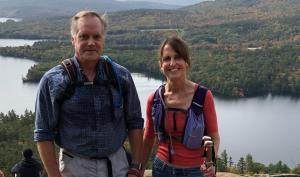She initially joined Moderna mid-pandemic to run the Zika vaccine program. The job was an opportunity to return to the vaccine development field that she’s grown to love.
“I just really enjoy working on vaccines and the contribution to human health that you have when you’re preventing disease,” said Aunins, who was a Rodman Scholar at UVA and today serves on the Department of Chemical Engineering’s advisory board.
Her evolution to that way of thinking started in graduate school as she got closer to choosing a career.
“I began thinking not just about the type of work I was doing, but what kind of benefit it would have,” she said. “So most of the jobs I inquired about were in the pharma side of things.”
Those inquiries led to success on a path her UVA experiences helped to pave.
“I think the Rodman and Echols scholar communities – some of whom are lifelong friends – and professor Doug LeVan were key,” Aunins said, referring to the former UVA professor who is also an alumnus of UVA chemical engineering. “I did my fourth-year capstone in the LeVan Lab, and he gave me good advice on how to prepare to be successful at MIT, such as taking an extra upper-level math class.”
“Also, the approachability of the UVA faculty in general made the environment really great. I felt like they had faith in me, which encouraged me later in the competitive environment at MIT,” she said.
Over 30 years in pharma, most of them at Merck, Aunins went from using her technical training in chemical engineering in specific ways to ever broader leadership roles. She joined Moderna after two years working on the merging of two pharmaceutical sciences departments – almost 1,000 people – when her then employer, Takeda, acquired Shire Pharmaceuticals.
“That was kind of a fun, unusual job, and I think all the experience I had at Merck, in research, manufacturing, and project leadership and management, led to me being a good choice for that job,” Aunins said.
Although Aunins had been passionate about previous work on vaccines such as Gardasil, which prevents cervical cancer, and – when her three children were young – on a pediatric pneumonia vaccine, arriving at Moderna in the summer of 2020 had a different vibe.
“I was hired because everybody else was going off to work on COVID and they needed new people to keep the rest of the programs going,” she said. “I found that on my program, I had a ton of autonomy and was able to move it forward with a lot of independence.”
About six weeks after she started, Moderna asked most of her Zika team members to redeploy to the COVID-19 program, which included developing a second-generation COVID vaccine with longer refrigerator shelf life than the original. While keeping the Zika vaccine moving, most of Aunins’ efforts went into the second-generation program and to ensuring its strategy aligned with the overall COVID-19 vaccine program.
From this vantage, Aunins saw the stunning speed with which Moderna developed its mRNA vaccine in response to the pandemic by building on the company’s years of experience developing the technology. Within a year of the work starting, the Food and Drug Administration authorized the vaccine for emergency use.
“I could see just a flurry of activity, people working tirelessly, information being generated, timelines like I’d never seen before,” she recalled. “There was an intensity and a passion for changing the world. I mean, people were really, really super excited about being able to make such a difference.”
All of that was before Moderna named Aunins the program leader for the entire COVID-19 vaccine program in the summer of 2021. Thanks to the virus’ unpredictable course, the furious pace continues, only now Aunins is at the center of the activity. Since taking on the program, she’s worked on regulatory approvals for pediatric and booster doses and evaluated the need for variant-specific vaccines.
On Jan. 31 this year, the FDA completed its scientific review of Moderna’s safety and efficacy data, and fully approved the Moderna COVID-19 Vaccine for individuals 18 years and older. This decision removed the emergency use authorization caveat – one more in a series of steps toward defeating COVID-19.
Last October, when the FDA’s advisory panel gave its unanimous recommendation for emergency use authorization of Moderna’s booster dose, Aunins recalled the team breaking out champagne to mark the culmination of a lot of hard work. She celebrated, too, but without partaking. She was training for a marathon the next week, and hoped her finishing time in the race would qualify her for the Boston Marathon. It did.
Those 10-mile training runs before work kept her ready to take on 11 hours of back-to-back meetings and the constant assimilation of the data driving Moderna’s decision-making, said Aunins, who equally enjoys rowing on Boston’s Charles River. Exercise also helps balance the unusually immersive experience of being at the center of a global crisis response.
“Seeing your company in the news all the time, or while commuting to work and listening to the radio or a podcast, you’re hearing things related to the disease, your job, and even your boss; it’s around you all the time,” she said.
That can be hard and create a feeling of great responsibility, but it has a big upside.
“Before this, I didn’t usually have people thank me when they found out my job,” Aunins said. “So that's pretty cool.”

